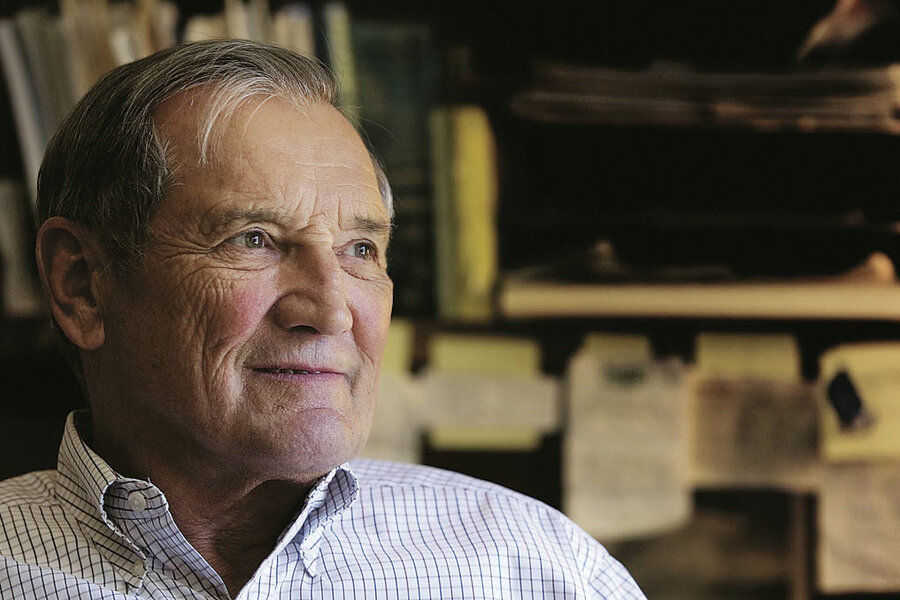Swedish ambassador visits 85-year-old US vet held in North Korea
Loading...
| San Francisco
The family of an elderly US tourist detained for more than a month in North Korea said Saturday the Swedish ambassador has seen the man and found him to be in good health.
Merrill Newman's family in California said in a statement that the State Department told them that the Swedish ambassador to North Korea had visited the 85-year-old at a Pyongyang hotel.
"We were very pleased to hear that the Ambassador was allowed to pay this first visit to Merrill," the statement said. "As a result of the visit, we know that Merrill is in good health. ... Merrill reports that he is being well treated and that the food is good."
An Obama administration official called for his release, urging North Korea to consider his age and health conditions.
Sweden handles consular issues for Americans in North Korea as the US and North Korea have no diplomatic relations.
Newman's family said the ambassador's visit eased their concerns about his health, and pleaded with North Korean authorities to take his health and age into account and let him go as an act of humanitarian compassion.
The family's report came hours after North Korea state media released video showing Newman reading an apology for alleged crimes during the Korean War and for "hostile acts" against the state during a recent trip.
Pyongyang has been accused of previously coercing statements from detainees. There was no way to reach Newman and determine the circumstances of the alleged confession. But it was riddled with stilted English and grammatical errors, such as "I want not punish me."
"I have been guilty of a long list of indelible crimes against DPRK government and Korean people," Newman purportedly wrote in a four-page statement, adding: "Please forgive me."
The statement, carried in the North's official Korean Central News Agency, said the war veteran allegedly attempted to meet with any surviving soldiers he had trained during the Korean War to fight North Korea, and that he admitted to killing civilians and brought an e-book criticizing North Korea. DPRK stands for the Democratic People's Republic of Korea, North Korea's official name.
It wasn't clear what would happen to Newman now. But the statement alleges that Newman says if he goes back to the US he will tell the truth about the country — a possible indication that Newman could be released.
The apology can be seen as Pyongyang taking steps needed to release Newman, said Yoo Ho-Yeol, a professor of North Korea studies at Korea University in Seoul.North Korea likely issued the confession in the form of an apology to resolve Newman's case quickly without starting legal proceedings, Yoo said.
North Korea is extremely sensitive about any criticism and regularly accuses Washington and Seoul of seeking to overthrow its authoritarian system through various means — claims the US and South Korea dismiss. The State Department has repeatedly warned Americans about traveling to the country, citing the risk of arbitrary detention.
Newman, an avid traveler and retired finance executive, was taken off a plane Oct. 26 by North Korean authorities while preparing to leave the country after a 10-day tour. His traveling companion seated next to him, neighbor and former Stanford University professor Bob Hamrdla, was allowed to depart.
Newman's son, Jeffrey Newman, said his father wanted to return to the country where he spent three years during the Korean War.
North Korea has detained at least six Americans since 2009, including two journalists accused of trespassing and others, some of whom are of Korean ancestry, accused of spreading Christianity. Kenneth Bae, a Korean-American missionary and tour operator, has been detained for more than a year. North Korea sees missionary work as a Western threat to its authoritarian government.
In Washington, Caitlin Hayden, spokeswoman for the National Security Council, said the US remains "deeply concerned about the welfare" of Bae and Newman and urged North Korea to release both men immediately.
"Given Mr. Newman's advanced age and health conditions, we urge the DPRK to release Mr. Newman so he may return home and reunite with his family," Hayden said.
In a statement Saturday, Bae's family said it was thankful of the US call for the release of both men. "Now we're including Mr. Newman in our prayers," the family said.
Whatever the reasons behind the detention, it could hurt impoverished North Korea's efforts to encourage a growing tourism trade seen as a rare source of much-needed foreign currency.
Tourism is picking up in North Korea, despite strong warnings from the State Department, most recently this week. Americans travel there each year, many as part of humanitarian efforts or to find long-lost relatives or to see a closed society few outsiders get to visit.
Associated Press writers Foster Klug and Eun-Young Jeong, and Eric Talmadge in Tokyo contributed to this report.







